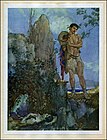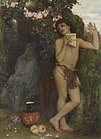Idyll III
Idyll III, also called Κώμος ('The Serenade'), is a bucolic poem by the 3rd-century BC Greek poet Theocritus.[1] The poet appears to personate a young goatherd, who after five lines dedicatory to a friend whom he calls Tityrus, serenades his mistress Amaryllis outside her cave.[1][2] The poem is a monologue, but, like Idyll II, preserves the dialogue-form by means of a dumb character.[1]
Summary
A goatherd, leaving his goats to feed on the hill-side, in the charge of Tityrus, approaches the cavern of Amaryllis, with its veil of ferns and ivy, and attempts to win back the heart of the girl by song.[3] He mingles promises with threats, and repeats in verse the names of the famous lovers of old days, Milanion and Endymion.[3] Failing to move Amaryllis, the goatherd threatens to die where he has thrown himself down, beneath the trees.[3]
Analysis
According to J. M. Edmonds, "The appeal to Amaryllis may be regarded as consisting of three parts each ending with the offer of a gift—apples, garland, a goat—and a fourth part containing a love-song of four stanzas. The reciter would doubtless make a slight pause to mark the rejection of each gift and the failure of the song before the renewal of the cry of despair."[1]
Illustrations
-
 'Ah, lovely Amaryllis, why no more, as of old, dost thou glance through this cavern after me, nor callest me, thy sweetheart, to thy side'
'Ah, lovely Amaryllis, why no more, as of old, dost thou glance through this cavern after me, nor callest me, thy sweetheart, to thy side' -
Endymion asleep, watched by Selene; engraved by Cornelis Bloemaert and Theodor Matham after Abraham van Diepenbeeck, c. 1635–8
-
The complaint of the shepherd (Amaryllis); painted by Arnold Böcklin, 1866
See also
References
Sources
- Chesi, G. M. (2018). "Intertextuality and Poetic Voice in Theocritus' Idyll 3". Mnemosyne. 71 (3): 489–96.
Attribution: ![]() This article incorporates text from these sources, which are in the public domain.
This article incorporates text from these sources, which are in the public domain.
- Edmonds, J. M., ed. (1919). The Greek Bucolic Poets (3rd ed.). William Heinemann. pp. 41–7.
- Lang, Andrew, ed. (1880). Theocritus, Bion, and Moschus. London: Macmillan and Co. pp. 16–18.
Further reading
- Cholmeley, R. J., ed. (1919). The Idylls of Theocritus (2nd ed.). London: G. Bell & Sons, Ltd. pp. 211–20.
- Higham, T. F.; Bowra, C. M. (eds.). The Oxford Book of Greek Verse in Translation. Oxford: Clarendon Press. pp. 550, 742.
- Segal, Charles (1969). "Adonis and Aphrodite: Theocritus, Idyll III, 48". L'Antiquité Classique. 38 (1): 82–8.
External links
 Greek Wikisource has original text related to this article: Κώμος
Greek Wikisource has original text related to this article: Κώμος Media related to Idyll III at Wikimedia Commons
Media related to Idyll III at Wikimedia Commons- "Theocritus, Idylls, κῶμος". Perseus Digital Library.


